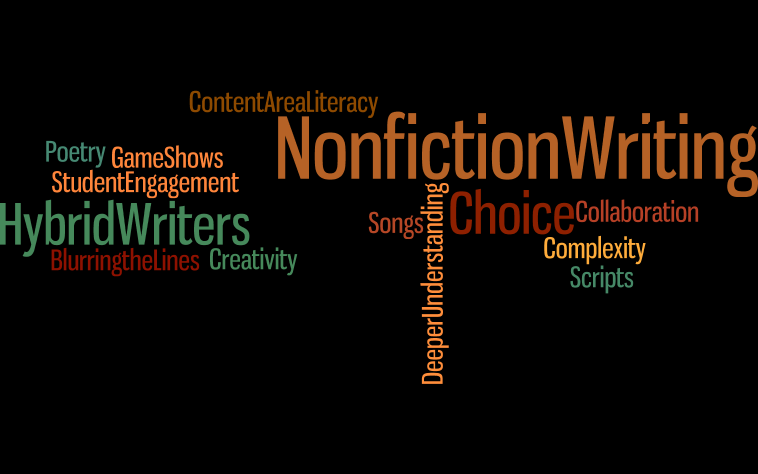Chapter 8: Redefining Nonfiction Writing
8.3 On Being a Hybrid Writer—A Student’s Perspective

I recently asked Elizabeth, a former fourth grade student now in sixth grade, why she thought the work we had done in fourth grade with nonfiction writing was important. Without hesitation, she rattled off a few things.
When you write nonfiction, you can’t just make things up. You have to think about it and make it realistic. It has to be true. It makes you review the information you are learning because you are repeating it in your mind.
When I pressed further and asked if she felt the nonfiction literary writing she had done during the two years I was her teacher were beneficial to her, she continued:
When I write in a different style, it helps me think about the information I am learning in two different ways. I have to think about what the article says and then how I am going to write about it. My writing has to make sense. I have to make sure it has the right information, so I have to think about it.
When I worked on the radio ad [a social studies project] with my group, I learned from others. I learned the answers to some questions about our empire. Sometimes I was like, ‘Oh, that’s what that meant, and then I understood it better.’ Or maybe I hadn’t thought about the question someone asked, and then I learned the answer to it. As more people added their perspectives to the answer, I understood it even better.
My conversation with Elizabeth confirmed my belief that infusing creative expression into nonfiction writing experiences is truly advantageous for my students but in more ways than I had even imagined. They are able to wrestle with ideas and concepts and grapple with the best way to express what it is they want to say. They have the opportunity to collaborate and learn from their peers. They are immersed in the learning process on a deeper level. Using writing genres generally associated with fiction to convey information requires something more from them as students. It requires them to think in a whole new way.
My students have become hybrid writers – connecting their learning in ways that suit them and their learning preferences. They tangle with nonfiction information as they read it and analyze it, and then they assimilate what they have learned into various forms of writing. Through the struggle that comes with these writing experiences, they ponder, they learn, and they become better writers and better thinkers. What is the best way to express the information in this article? A poem? A Readers’ Theater? A monologue? What is the most important information I need to share? What do I want my audience to learn? These are just a few of the many essential questions students must consider they write nonfiction.
There are other surprises and less obvious benefits that have come from these writing practices too. New friendships have developed as a result of collaborative experiences. Quiet students have stepped out of their comfort zone to sing a song that they have written in front of the class! A close classroom community has developed as students have shared their talents, personalities, and interests through their writing. I have gotten to know my students better which has helped me to better meet their needs. And my students have become more reflective about their own learning process as they have opportunities to see what they know and what it is they still need to find out in order to grasp a new concept.
I realize that I have not officially redefined the meaning of nonfiction writing; what I refer to in this chapter is often referred to as literary nonfiction. However, I have redefined what nonfiction writing means to me and my students. For us it is the chance to think “out of the box” as we learn about and communicate new content and ideas. It is the chance to show our understanding in ways that suit our individual learning styles. It is a chance to fuse all of the subjects together as we deepen our comprehension and thinking about content material. So, yes, I enjoy blurring the lines between fiction and nonfiction as I stretch my students’ thinking. I am happy to be a hybrid teacher guiding students to become hybrid writers.